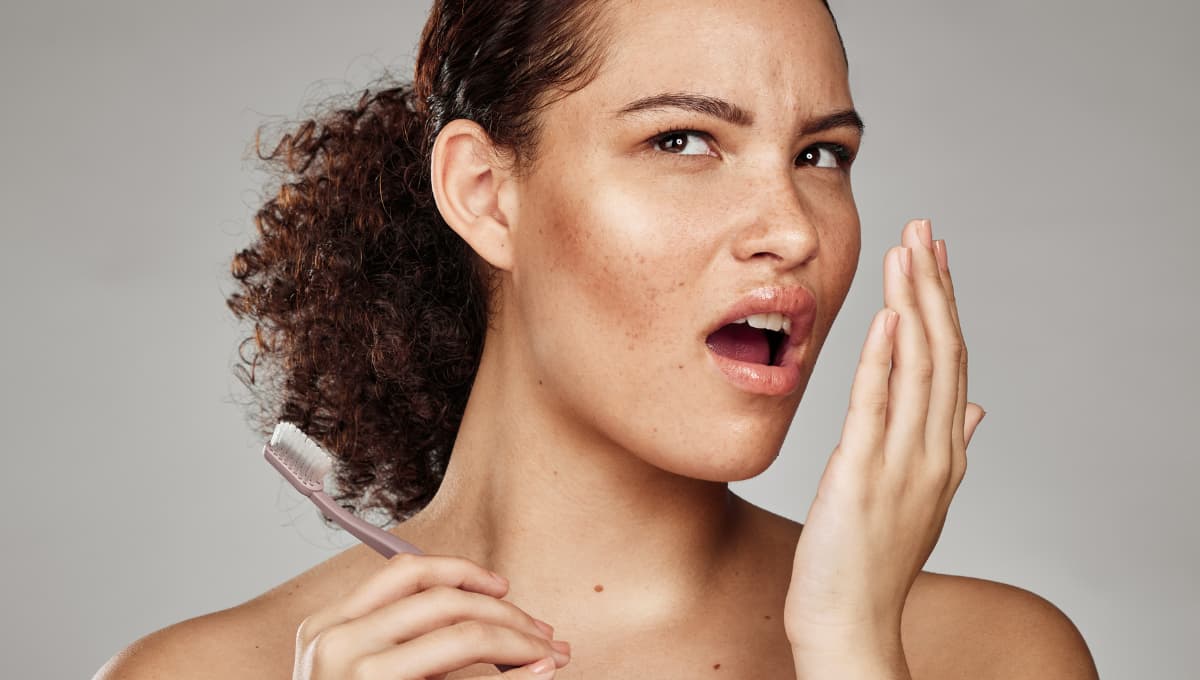TEETH - STRAIGHTENING TREATMENT
SERVICES
RESOURCES
SHOP
MEDICAL CERTIFICATIONS
Certifications ensuring safety, quality, and compliance with global standards.
Certifications ensuring safety, quality, and compliance with global standards.
Bad breath (halitosis) is a common but frustrating condition that can affect confidence and social interactions. In many cases, brushing alone doesn’t solve the problem because the root cause goes deeper.
This guide explains the most common causes of bad breath and offers effective, lasting remedies—plus when to seek help from a dental professional.
Here’s a breakdown of common causes—and what you can do about them:
1. Poor Oral Hygiene
Cause: Irregular brushing and flossing allow food particles and plaque to build up, producing odour-causing bacteria.
Fix: Brush twice daily, floss once a day, and don’t forget to clean your tongue.
2. Dry Mouth (Xerostomia)
Cause: Saliva helps rinse away bacteria. A dry mouth allows bacteria to thrive.
Fix: Stay hydrated, chew sugar-free gum, and use saliva-boosting mouthwashes. Avoid caffeine and alcohol.
3. Foods & Drinks
Cause: Garlic, onions, coffee, and spicy foods can leave lingering odours.
Fix: Rinse your mouth after eating strong-smelling foods and balance your diet with fresh fruits and vegetables.
4. Smoking & Tobacco
Cause: Tobacco dries the mouth, worsens gum health, and causes strong odors.
Fix: Quit smoking and seek support programs or alternatives.
5. Gum Disease or Cavities
Cause: Infections create pockets where bacteria thrive.
Fix: Visit a dentist for cleaning or treatment—brushing alone won’t resolve this.
6. Sinus or Throat Issues
Cause: Postnasal drip and tonsil stones can harbour bacteria.
Fix: Treat underlying infections, use saline rinses, and stay hydrated.
7. Acid Reflux (GERD)
Cause: Stomach acid can reach the mouth, causing sour breath.
Fix: Avoid trigger foods, eat smaller meals, and consult your doctor.
8. Medical Conditions
Cause: Diabetes, liver or kidney disease can release compounds with strong odors.
Fix: Seek medical evaluation—treating the condition can relieve the breath issue.

Yes—if the root cause is addressed. Good oral hygiene and lifestyle changes can eliminate most forms of bad breath. For chronic halitosis, diagnosis and treatment of underlying conditions are essential.
Consider seeking a dentist if:
Getting professional help can uncover and treat any underlying issues, helping you maintain fresh breath and good oral health.

Bad breath doesn’t have to be permanent. With the right oral care routine and professional guidance, you can enjoy fresh, confident breath every day.
Need help managing chronic bad breath? Book a dental check-up with Dr Clear Aligners and get expert advice on long-term solutions tailored to your needs.
Get a free consultation with your orthodontist today to explore your options and take the first step towards achieving the smile of your dreams. Your journey to a confident smile starts now!
Many parents wonder when the right time is to fix their child’s teeth. Should you wait until all adult teeth ...
16 February 2026
Brushing your teeth while wearing braces is a bit more challenging than brushing natural teeth alone, but it’s essential for ...
9 February 2026
Watching your child’s smile develop can be exciting, but it can also be a little concerning if you notice crooked ...
3 February 2026
As a parent, it’s natural to wonder when, or if, your child needs orthodontic treatment. Many parents assume braces or ...
29 January 2026
Dental Bridges in Malaysia: Types, Prices & Mouth Bridge Cost Missing teeth can affect more than just your appearance. They ...
26 January 2026

